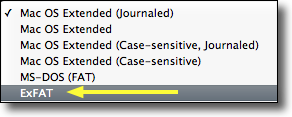Os X Support For Exfat
Jun 23, 2013 Mac OS X 10.6.5 was the first version which supported exFAT read/write operations. On the Windows platform, MS provides drivers for Windows XP and newer (newer versions (7+?) have already the drivers). Jul 03, 2020 Recently installed Ubuntu Server 20.04. I have 2 internal HDDs in this PC that were formatted in exFAT under Windows 10 before I wiped the PC to install Ubuntu Server. I used exFAT in case I ever need to move these internal drives back to a Windows machine (or, indeed, wipe the OS on this machine and install Windows instead). What operating systems support the exFAT file format? SDXC Memory Cards and 256GB CompactFlash cards are formatted natively in the exFAT file system. Flash Drives may also be formatted in exFAT. The operating system must support the exFAT file system in order for these devices to function properly.
Os X Support For Exfat Windows 7
Disk Utility User Guide
Disk Utility on Mac supports several file system formats:
Apple File System (APFS): The file system used by macOS 10.13 or later.
Mac OS Extended: The file system used by macOS 10.12 or earlier.
MS-DOS (FAT) and ExFAT: File systems that are compatible with Windows.
Apple File System (APFS)
Apple File System (APFS), the default file system for Mac computers using macOS 10.13 or later, features strong encryption, space sharing, snapshots, fast directory sizing, and improved file system fundamentals. While APFS is optimized for the Flash/SSD storage used in recent Mac computers, it can also be used with older systems with traditional hard disk drives (HDD) and external, direct-attached storage. macOS 10.13 or later supports APFS for both bootable and data volumes.
APFS allocates disk space within a container on demand. The disk’s free space is shared and can be allocated to any of the individual volumes in the container as needed. If desired, you can specify reserve and quota sizes for each volume. Each volume uses only part of the overall container, so the available space is the total size of the container, minus the size of all the volumes in the container.
Os X Support For Exfat Drive

Choose one of the following APFS formats for Mac computers using macOS 10.13 or later.
APFS: Uses the APFS format.
34 rows macOS High Sierra (version 10.13) is the fourteenth major release of macOS, Apple Inc.' S desktop operating system for Macintosh computers. MacOS High Sierra was announced at the WWDC 2017 on June 5, 2017 and was released on September 25, 2017. The name 'High Sierra' refers to the High Sierra region in California.Like with Snow Leopard, Mountain Lion and El Capitan, the name also. High sierra upgrade free.
APFS (Encrypted): Uses the APFS format and encrypts the volume.
APFS (Case-sensitive): Uses the APFS format and is case-sensitive to file and folder names. For example, folders named “Homework” and “HOMEWORK” are two different folders.
APFS (Case-sensitive, Encrypted): Uses the APFS format, is case-sensitive to file and folder names, and encrypts the volume. For example, folders named “Homework” and “HOMEWORK” are two different folders.
You can easily add or delete volumes in APFS containers. Each volume within an APFS container can have its own APFS format—APFS, APFS (Encrypted), APFS (Case-sensitive), or APFS (Case-sensitive, Encrypted).
Mac OS Extended
Choose one of the following Mac OS Extended file system formats for compatibility with Mac computers using macOS 10.12 or earlier.
Mac OS Extended (Journaled): Uses the Mac format (Journaled HFS Plus) to protect the integrity of the hierarchical file system.
Mac OS Extended (Journaled, Encrypted): Uses the Mac format, requires a password, and encrypts the partition.
Mac OS Extended (Case-sensitive, Journaled): Uses the Mac format and is case-sensitive to folder names. For example, folders named “Homework” and “HOMEWORK” are two different folders.
Mac OS Extended (Case-sensitive, Journaled, Encrypted): Uses the Mac format, is case-sensitive to folder names, requires a password, and encrypts the partition.
Windows-compatible formats
Choose one of the following Windows-compatible file system formats if you are formatting a disk to use with Windows.
MS-DOS (FAT): Use for Windows volumes that are 32 GB or less.
ExFAT: Use for Windows volumes that are over 32 GB.